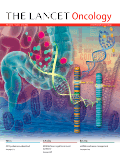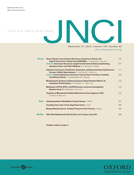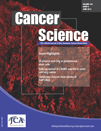
CANCER
Scope & Guideline
Elevating cancer research to new heights.
Introduction
Aims and Scopes
- Cancer Biology and Genetics:
Research that investigates the underlying biological mechanisms of cancer, including genetic mutations, epigenetics, and tumor microenvironment interactions. - Clinical Trials and Therapeutics:
Publications related to clinical trials evaluating new therapies, including immunotherapy, targeted therapies, and combination treatments, focusing on their efficacy and safety. - Epidemiology and Prevention:
Studies exploring cancer incidence, risk factors, and preventive measures, particularly in diverse populations and underserved communities. - Patient-Centered Care and Survivorship:
Research emphasizing the importance of quality of life, psychosocial factors, and survivorship issues for cancer patients, including financial toxicity and health disparities. - Health Policy and Access to Care:
Discussions on healthcare access, disparities in cancer treatment, and policy implications affecting cancer care delivery. - Innovative Technologies in Cancer Treatment:
Exploration of new technologies, including artificial intelligence and precision medicine, that enhance cancer diagnosis, treatment, and monitoring.
Trending and Emerging
- Personalized and Precision Medicine:
A growing emphasis on tailoring cancer treatment based on genetic, molecular, and patient-specific factors, leading to more effective and individualized therapies. - Health Disparities and Equity in Cancer Care:
Increased research focus on understanding and addressing disparities in cancer care and outcomes based on race, socioeconomic status, and geographic location. - Integration of Technology in Cancer Care:
The rise of digital health technologies, including telemedicine and mobile health apps, to enhance patient monitoring, treatment adherence, and communication in oncology. - Palliative Care and Quality of Life:
A significant uptick in studies examining the integration of palliative care early in the treatment process, focusing on improving quality of life and symptom management for patients. - Immunotherapy Advances:
Continued exploration of immunotherapeutic approaches, including combination therapies and novel agents, as a primary treatment modality for various cancers. - Cancer Survivorship and Long-Term Effects:
Research on the long-term impacts of cancer treatments on survivors, addressing both physical and psychosocial health outcomes.
Declining or Waning
- Traditional Chemotherapy Studies:
Research centered on standard chemotherapy regimens has decreased, likely due to the increasing emphasis on personalized medicine and targeted therapies that offer improved outcomes. - Epidemiological Studies on Common Cancers:
There is a noticeable reduction in publications focusing exclusively on common cancers (like breast and prostate cancer) without addressing disparities or novel treatment approaches. - Basic Science without Clinical Relevance:
Studies that focus solely on basic cancer biology without clear clinical implications or applications have become less prominent as the field shifts toward translational research. - Longitudinal Studies without Intervention Focus:
Longitudinal studies that do not propose or evaluate new interventions or treatment strategies are less frequently published, as there is a push for actionable research that impacts patient care. - General Health Services Research:
While still important, general studies on healthcare services are being overshadowed by more targeted research that addresses specific cancer types, therapies, and patient populations.
Similar Journals

BMC CANCER is a prestigious, peer-reviewed journal dedicated to advancing the field of cancer research and oncology since its inception in 2001. Published by BMC, a leading name in open-access publishing, this journal plays a crucial role in providing researchers, professionals, and students with a platform for high-quality scientific discourse. With an impressive impact factor, BMC CANCER is ranked in the Q2 quartile across multiple categories, including Cancer Research, Genetics, and Oncology, reflecting its commitment to impactful research and rigorous peer-review standards. The journal ensures broad accessibility to its content through its Open Access model, allowing findings to reach a global audience without financial barriers. The editorial board consists of recognized experts committed to fostering innovation and collaboration within the cancer research community. Researchers working at the intersection of cancer biology, treatment options, and genetic influences will find BMC CANCER an invaluable resource for sharing their findings and engaging with the latest developments in the field.

LANCET ONCOLOGY
Leading the way in oncology research and clinical excellence.The Lancet Oncology is a premier peer-reviewed journal published by Elsevier Science Inc., recognized as a leading authority in the field of oncology. With an ISSN of 1470-2045 and E-ISSN 1474-5488, this esteemed journal boasts an impressive 2023 impact factor placing it in the Q1 category of oncology—reflecting its role as a critical resource for cutting-edge research. The journal publishes high-quality articles covering novel scientific discoveries, clinical advancements, and public health issues related to cancer treatment and prevention. It is ranked #5 out of 404 in the Scopus Medicine _ Oncology category, demonstrating its influence and relevance in the field, with an outstanding rank in the 98th percentile. Operating from its base in the United Kingdom, The Lancet Oncology spans a comprehensive timeframe from 2000 to 2024, making it a vital repository of oncology literature. Although it does not primarily operate on an open-access model, its significant subscription base ensures that a wealth of knowledge is accessible to researchers, professionals, and students alike, fostering a profound understanding and advancement in oncology.

JNCI-Journal of the National Cancer Institute
Driving excellence in cancer research since 1940.JNCI-Journal of the National Cancer Institute, published by Oxford University Press Inc. in the United Kingdom, is a premier journal dedicated to advancing the field of cancer research and oncology. With a distinguished history dating back to 1940, this journal has consistently maintained a strong reputation within the academic community, achieving a remarkable Q1 ranking in both Cancer Research and Oncology as of 2023. Researchers and practitioners rely on the JNCI for original research articles, review papers, and cutting-edge findings that impact clinical practices and therapeutic strategies. Although it does not currently offer open access, the journal remains a vital resource for academicians and healthcare professionals seeking to enhance their understanding of cancer mechanisms and treatment innovations. Its rigorous peer-review process ensures the publication of high-quality, credible research that meets the evolving challenges of cancer treatment and prevention through to 2024.

Cancer Research Communications
Innovating cancer treatment through shared insights.Cancer Research Communications is an esteemed journal published by the American Association for Cancer Research, a leading organization in the field of oncology. This journal aims to advance knowledge in cancer research through the dissemination of high-quality, peer-reviewed articles that cover a wide range of topics related to cancer biology, treatment modalities, and prevention strategies. As an open-access journal, Cancer Research Communications ensures that vital research findings are accessible to a global audience, promoting collaboration and innovation within the scientific community. The journal serves as a crucial platform for researchers, professionals, and students to share their insights and foster the exchange of effective cancer therapies and methodologies. With a commitment to excellence, it plays a significant role in shaping the future of cancer research and therapeutic development.

Cancer Reports
Bridging gaps in cancer care with cutting-edge research.Cancer Reports, published by WILEY, is an esteemed open-access journal dedicated to the field of oncology and cancer research. With a focus on disseminating impactful research findings since its transition to fully open access in 2021, Cancer Reports aims to facilitate knowledge sharing among researchers, clinicians, and healthcare professionals globally. The journal is positioned within the Q3 quartile for both Cancer Research and Oncology categories as of 2023, reflecting its commitment to quality and relevance in a competitive publishing landscape. With an ISSN of N/A and an E-ISSN of 2573-8348, the journal showcases studies across diverse aspects of cancer biology, treatment modalities, and patient care strategies. Located in the United Kingdom at 111 River St, Hoboken 07030-5774, NJ, Cancer Reports strives to contribute to the advancement of cancer research and improve health outcomes for patients worldwide, making it a pivotal platform for scholars and practitioners in the oncology community.

BRITISH JOURNAL OF CANCER
Shaping the Future of Oncology Through Quality Scholarship.The British Journal of Cancer, published by SpringerNature, stands as a preeminent resource in the fields of Cancer Research and Oncology, with a distinguished history of publication dating back to 1947. With its Q1 rank in both categories for 2023, this journal is among the top-tier publications, offering cutting-edge research and insights into the biology, etiology, and treatment of cancer. The journal’s rigorous peer-review process ensures that readers are presented with high-quality studies that contribute to the advancement of cancer knowledge and clinical practice. Operating from the United Kingdom, it has garnered a notable impact factor and ranks impressively within Scopus, making it an essential publication for researchers, healthcare professionals, and students who are dedicated to understanding cancer's complexities. Access to the journal's articles is available in traditional formats, providing a versatile platform for disseminating pivotal research. As we move towards a future where cancer treatment and prevention remain crucial, the British Journal of Cancer continues to play a vital role in shaping the dialogue and discoveries within the oncology community.

BREAST CANCER RESEARCH AND TREATMENT
Leading the Charge in Breast Cancer InnovationBreast Cancer Research and Treatment, published by Springer, stands as a pivotal journal within the domains of Cancer Research and Oncology, exemplified by its impressive Q2 and Q1 quartile rankings, respectively, in the 2023 category rankings. Since its inception in 1981, this journal has provided a vital platform for disseminating cutting-edge research focused on all aspects of breast cancer, ranging from molecular biology to treatment strategies. With an ISSN of 0167-6806 and E-ISSN of 1573-7217, it captures a broad audience of researchers, clinicians, and students dedicated to improving patient outcomes. The journal emphasizes high-quality, peer-reviewed studies that pave the way for advancements in therapy and direct novel insights into oncological practices. By maintaining a strong ranking in Scopus with percentile placements of 74th in Oncology and 61st in Cancer Research, Brest Cancer Research and Treatment continues to foster innovation and collaboration in the fight against breast cancer.

Cancers
Transforming cancer knowledge into impactful solutions.Cancers is a leading peer-reviewed journal published by MDPI, dedicated to advancing the field of oncology and cancer research. Established in 2009 and based in Switzerland, this Open Access journal provides a platform for the rapid dissemination of high-quality research findings, reviews, and clinical studies related to all aspects of cancer biology and treatment. With an impressive impact factor and recognized as Q1 in Oncology and Q2 in Cancer Research for 2023, Cancers strives to foster a collaborative environment among researchers, healthcare professionals, and students seeking to deepen their knowledge and understanding of cancer. The journal’s commitment to accessibility and its broad scope make it an invaluable resource for anyone passionate about combating cancer and improving patient outcomes. For more information and to access its diverse publications, visit the journal’s website.

Breast Cancer
Connecting global minds to combat breast cancer challenges.Breast Cancer is a prestigious peer-reviewed journal published by SPRINGER JAPAN KK, specializing in the multifaceted domains of oncology and medical pharmacology. With an impressive impact factor and recognized within the Q1 category in multiple areas, including Medicine (miscellaneous), Radiology, and Nuclear Medicine and Imaging, this journal serves as a fundamental resource for cutting-edge research and clinical advancements in breast cancer treatment and care. Its indexed presence in renowned databases like Scopus further affirms its significance, ranking 56th in Radiology and 60th in Pharmacology. The journal aims to bridge the gap between clinical practice and scientific research by publishing original articles, reviews, and case studies that enhance understanding and improve patient outcomes. With converged content available from 1994 to 2024, the journal is dedicated to fostering innovative research while engaging a global audience of researchers, clinicians, and students passionate about tackling breast cancer challenges.

CANCER SCIENCE
Exploring the forefront of cancer science and medicine.Cancer Science, an esteemed journal published by Wiley, stands at the forefront of oncology research, boasting an impressive impact factor and a classification in the Q1 category for its contributions in Cancer Research, Medicine, and Oncology as of 2023. Since its inception in 2003 and transitioning to an Open Access model in 2014, the journal has facilitated global dissemination of critical research findings, ensuring that vital information remains accessible to researchers, clinicians, and students alike. With its comprehensive scope covering cutting-edge discoveries in cancer biochemistry, genetics, and molecular biology, Cancer Science is recognized for its rigorous peer-review process and significant contributions to advancing our understanding of cancer. The journal, located at 111 River St, Hoboken, NJ, is an essential resource for anyone dedicated to improving treatment outcomes and pushing the boundaries of cancer research.